Critical Reflection on Health Education Session & Improvement
VerifiedAdded on 2023/06/14
|7
|2064
|475
Essay
AI Summary
This essay critically reflects on the design and delivery of a health education session focused on promoting antenatal colostrum expression to prevent hypoglycaemia in newborns of diabetic mothers. Using Gibbs' Reflective Model, the author describes the session, including its aim to upskill midwives, the learning theories applied, and the practical aspects of colostrum expression. The reflection covers feelings, evaluation, and analysis of the session's strengths and weaknesses, highlighting the importance of early colostrum feeding for diabetic mothers' newborns. Recommendations for improvement include enhancing midwives' knowledge through breastfeeding information and practical demonstrations. The essay concludes that such training improves the care provided to diabetic mothers and the well-being of their newborns, emphasizing the need for continuous upskilling in neonatal care.

Critical Reflection.
Paraphrase This Document
Need a fresh take? Get an instant paraphrase of this document with our AI Paraphraser
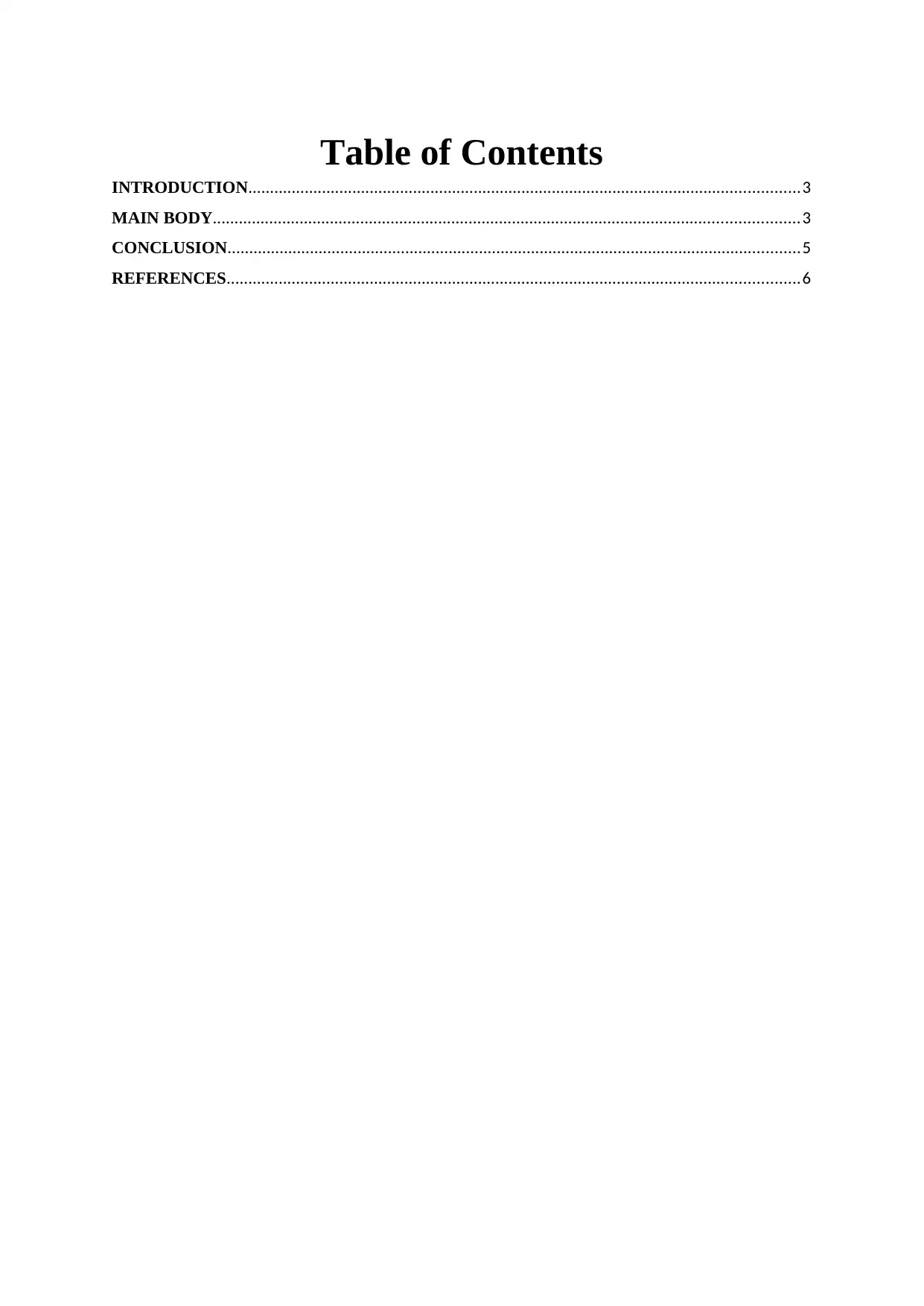
Table of Contents
INTRODUCTION...............................................................................................................................3
MAIN BODY.......................................................................................................................................3
CONCLUSION....................................................................................................................................5
REFERENCES....................................................................................................................................6
INTRODUCTION...............................................................................................................................3
MAIN BODY.......................................................................................................................................3
CONCLUSION....................................................................................................................................5
REFERENCES....................................................................................................................................6
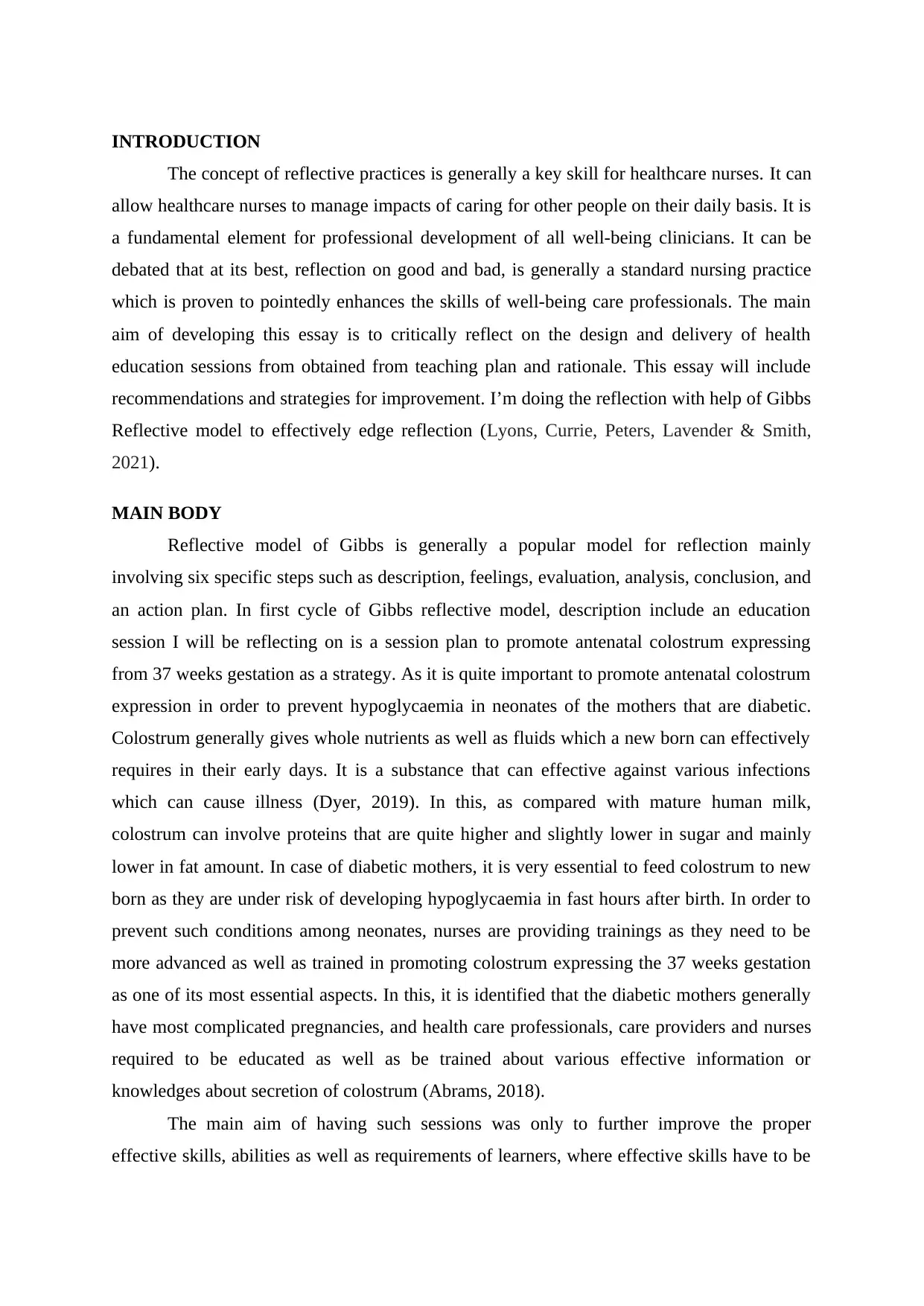
INTRODUCTION
The concept of reflective practices is generally a key skill for healthcare nurses. It can
allow healthcare nurses to manage impacts of caring for other people on their daily basis. It is
a fundamental element for professional development of all well-being clinicians. It can be
debated that at its best, reflection on good and bad, is generally a standard nursing practice
which is proven to pointedly enhances the skills of well-being care professionals. The main
aim of developing this essay is to critically reflect on the design and delivery of health
education sessions from obtained from teaching plan and rationale. This essay will include
recommendations and strategies for improvement. I’m doing the reflection with help of Gibbs
Reflective model to effectively edge reflection (Lyons, Currie, Peters, Lavender & Smith,
2021).
MAIN BODY
Reflective model of Gibbs is generally a popular model for reflection mainly
involving six specific steps such as description, feelings, evaluation, analysis, conclusion, and
an action plan. In first cycle of Gibbs reflective model, description include an education
session I will be reflecting on is a session plan to promote antenatal colostrum expressing
from 37 weeks gestation as a strategy. As it is quite important to promote antenatal colostrum
expression in order to prevent hypoglycaemia in neonates of the mothers that are diabetic.
Colostrum generally gives whole nutrients as well as fluids which a new born can effectively
requires in their early days. It is a substance that can effective against various infections
which can cause illness (Dyer, 2019). In this, as compared with mature human milk,
colostrum can involve proteins that are quite higher and slightly lower in sugar and mainly
lower in fat amount. In case of diabetic mothers, it is very essential to feed colostrum to new
born as they are under risk of developing hypoglycaemia in fast hours after birth. In order to
prevent such conditions among neonates, nurses are providing trainings as they need to be
more advanced as well as trained in promoting colostrum expressing the 37 weeks gestation
as one of its most essential aspects. In this, it is identified that the diabetic mothers generally
have most complicated pregnancies, and health care professionals, care providers and nurses
required to be educated as well as be trained about various effective information or
knowledges about secretion of colostrum (Abrams, 2018).
The main aim of having such sessions was only to further improve the proper
effective skills, abilities as well as requirements of learners, where effective skills have to be
The concept of reflective practices is generally a key skill for healthcare nurses. It can
allow healthcare nurses to manage impacts of caring for other people on their daily basis. It is
a fundamental element for professional development of all well-being clinicians. It can be
debated that at its best, reflection on good and bad, is generally a standard nursing practice
which is proven to pointedly enhances the skills of well-being care professionals. The main
aim of developing this essay is to critically reflect on the design and delivery of health
education sessions from obtained from teaching plan and rationale. This essay will include
recommendations and strategies for improvement. I’m doing the reflection with help of Gibbs
Reflective model to effectively edge reflection (Lyons, Currie, Peters, Lavender & Smith,
2021).
MAIN BODY
Reflective model of Gibbs is generally a popular model for reflection mainly
involving six specific steps such as description, feelings, evaluation, analysis, conclusion, and
an action plan. In first cycle of Gibbs reflective model, description include an education
session I will be reflecting on is a session plan to promote antenatal colostrum expressing
from 37 weeks gestation as a strategy. As it is quite important to promote antenatal colostrum
expression in order to prevent hypoglycaemia in neonates of the mothers that are diabetic.
Colostrum generally gives whole nutrients as well as fluids which a new born can effectively
requires in their early days. It is a substance that can effective against various infections
which can cause illness (Dyer, 2019). In this, as compared with mature human milk,
colostrum can involve proteins that are quite higher and slightly lower in sugar and mainly
lower in fat amount. In case of diabetic mothers, it is very essential to feed colostrum to new
born as they are under risk of developing hypoglycaemia in fast hours after birth. In order to
prevent such conditions among neonates, nurses are providing trainings as they need to be
more advanced as well as trained in promoting colostrum expressing the 37 weeks gestation
as one of its most essential aspects. In this, it is identified that the diabetic mothers generally
have most complicated pregnancies, and health care professionals, care providers and nurses
required to be educated as well as be trained about various effective information or
knowledges about secretion of colostrum (Abrams, 2018).
The main aim of having such sessions was only to further improve the proper
effective skills, abilities as well as requirements of learners, where effective skills have to be
⊘ This is a preview!⊘
Do you want full access?
Subscribe today to unlock all pages.

Trusted by 1+ million students worldwide
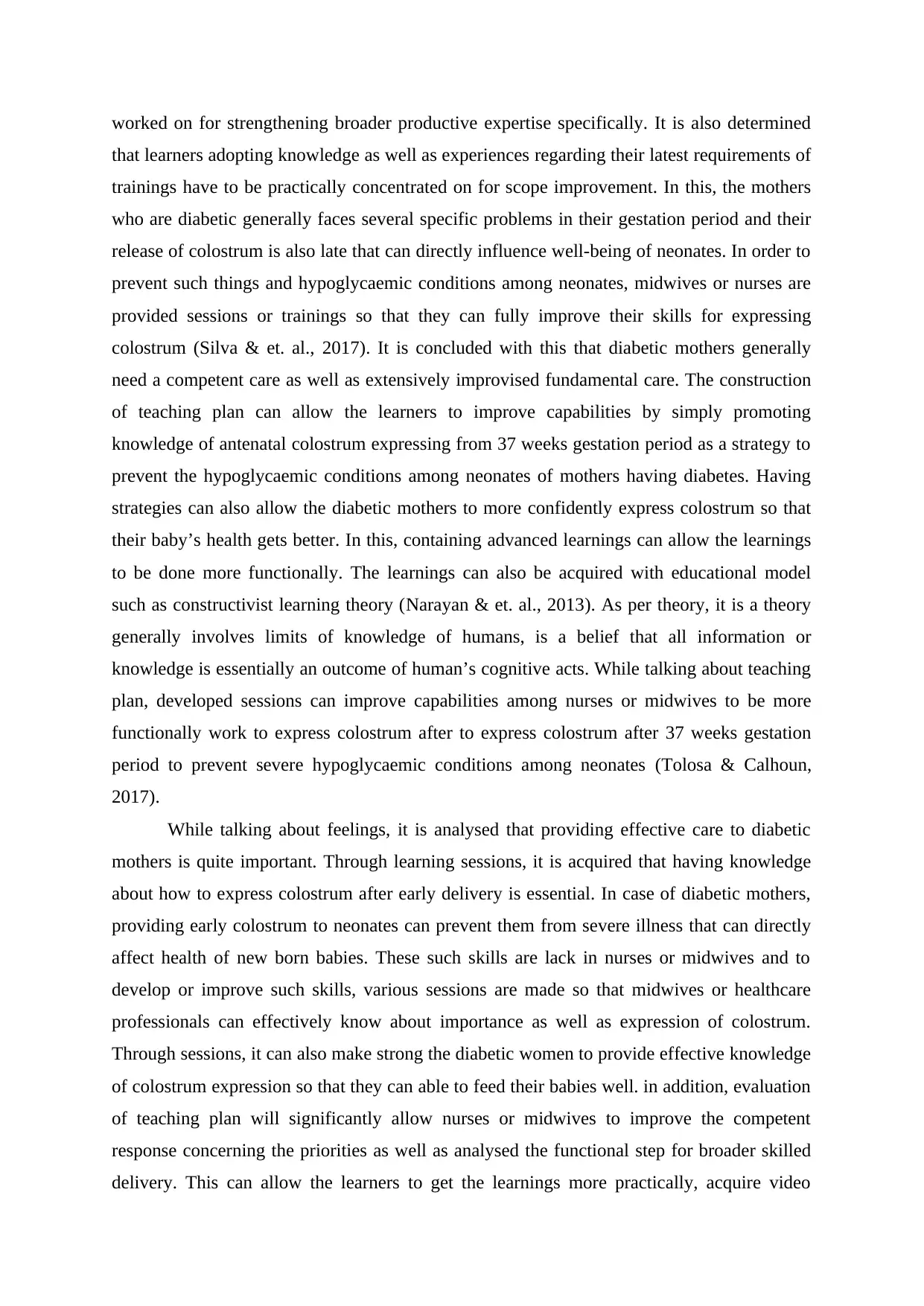
worked on for strengthening broader productive expertise specifically. It is also determined
that learners adopting knowledge as well as experiences regarding their latest requirements of
trainings have to be practically concentrated on for scope improvement. In this, the mothers
who are diabetic generally faces several specific problems in their gestation period and their
release of colostrum is also late that can directly influence well-being of neonates. In order to
prevent such things and hypoglycaemic conditions among neonates, midwives or nurses are
provided sessions or trainings so that they can fully improve their skills for expressing
colostrum (Silva & et. al., 2017). It is concluded with this that diabetic mothers generally
need a competent care as well as extensively improvised fundamental care. The construction
of teaching plan can allow the learners to improve capabilities by simply promoting
knowledge of antenatal colostrum expressing from 37 weeks gestation period as a strategy to
prevent the hypoglycaemic conditions among neonates of mothers having diabetes. Having
strategies can also allow the diabetic mothers to more confidently express colostrum so that
their baby’s health gets better. In this, containing advanced learnings can allow the learnings
to be done more functionally. The learnings can also be acquired with educational model
such as constructivist learning theory (Narayan & et. al., 2013). As per theory, it is a theory
generally involves limits of knowledge of humans, is a belief that all information or
knowledge is essentially an outcome of human’s cognitive acts. While talking about teaching
plan, developed sessions can improve capabilities among nurses or midwives to be more
functionally work to express colostrum after to express colostrum after 37 weeks gestation
period to prevent severe hypoglycaemic conditions among neonates (Tolosa & Calhoun,
2017).
While talking about feelings, it is analysed that providing effective care to diabetic
mothers is quite important. Through learning sessions, it is acquired that having knowledge
about how to express colostrum after early delivery is essential. In case of diabetic mothers,
providing early colostrum to neonates can prevent them from severe illness that can directly
affect health of new born babies. These such skills are lack in nurses or midwives and to
develop or improve such skills, various sessions are made so that midwives or healthcare
professionals can effectively know about importance as well as expression of colostrum.
Through sessions, it can also make strong the diabetic women to provide effective knowledge
of colostrum expression so that they can able to feed their babies well. in addition, evaluation
of teaching plan will significantly allow nurses or midwives to improve the competent
response concerning the priorities as well as analysed the functional step for broader skilled
delivery. This can allow the learners to get the learnings more practically, acquire video
that learners adopting knowledge as well as experiences regarding their latest requirements of
trainings have to be practically concentrated on for scope improvement. In this, the mothers
who are diabetic generally faces several specific problems in their gestation period and their
release of colostrum is also late that can directly influence well-being of neonates. In order to
prevent such things and hypoglycaemic conditions among neonates, midwives or nurses are
provided sessions or trainings so that they can fully improve their skills for expressing
colostrum (Silva & et. al., 2017). It is concluded with this that diabetic mothers generally
need a competent care as well as extensively improvised fundamental care. The construction
of teaching plan can allow the learners to improve capabilities by simply promoting
knowledge of antenatal colostrum expressing from 37 weeks gestation period as a strategy to
prevent the hypoglycaemic conditions among neonates of mothers having diabetes. Having
strategies can also allow the diabetic mothers to more confidently express colostrum so that
their baby’s health gets better. In this, containing advanced learnings can allow the learnings
to be done more functionally. The learnings can also be acquired with educational model
such as constructivist learning theory (Narayan & et. al., 2013). As per theory, it is a theory
generally involves limits of knowledge of humans, is a belief that all information or
knowledge is essentially an outcome of human’s cognitive acts. While talking about teaching
plan, developed sessions can improve capabilities among nurses or midwives to be more
functionally work to express colostrum after to express colostrum after 37 weeks gestation
period to prevent severe hypoglycaemic conditions among neonates (Tolosa & Calhoun,
2017).
While talking about feelings, it is analysed that providing effective care to diabetic
mothers is quite important. Through learning sessions, it is acquired that having knowledge
about how to express colostrum after early delivery is essential. In case of diabetic mothers,
providing early colostrum to neonates can prevent them from severe illness that can directly
affect health of new born babies. These such skills are lack in nurses or midwives and to
develop or improve such skills, various sessions are made so that midwives or healthcare
professionals can effectively know about importance as well as expression of colostrum.
Through sessions, it can also make strong the diabetic women to provide effective knowledge
of colostrum expression so that they can able to feed their babies well. in addition, evaluation
of teaching plan will significantly allow nurses or midwives to improve the competent
response concerning the priorities as well as analysed the functional step for broader skilled
delivery. This can allow the learners to get the learnings more practically, acquire video
Paraphrase This Document
Need a fresh take? Get an instant paraphrase of this document with our AI Paraphraser
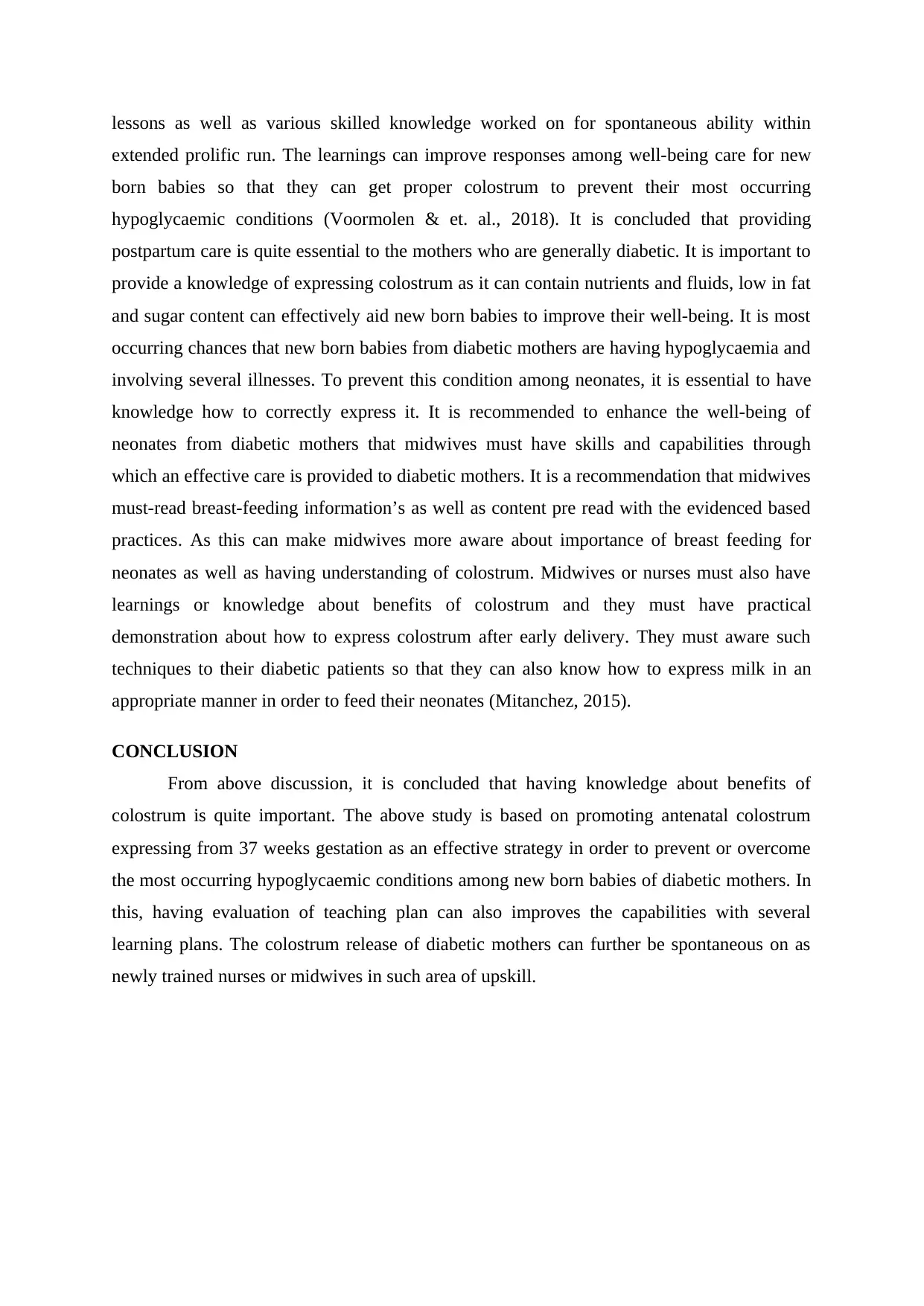
lessons as well as various skilled knowledge worked on for spontaneous ability within
extended prolific run. The learnings can improve responses among well-being care for new
born babies so that they can get proper colostrum to prevent their most occurring
hypoglycaemic conditions (Voormolen & et. al., 2018). It is concluded that providing
postpartum care is quite essential to the mothers who are generally diabetic. It is important to
provide a knowledge of expressing colostrum as it can contain nutrients and fluids, low in fat
and sugar content can effectively aid new born babies to improve their well-being. It is most
occurring chances that new born babies from diabetic mothers are having hypoglycaemia and
involving several illnesses. To prevent this condition among neonates, it is essential to have
knowledge how to correctly express it. It is recommended to enhance the well-being of
neonates from diabetic mothers that midwives must have skills and capabilities through
which an effective care is provided to diabetic mothers. It is a recommendation that midwives
must-read breast-feeding information’s as well as content pre read with the evidenced based
practices. As this can make midwives more aware about importance of breast feeding for
neonates as well as having understanding of colostrum. Midwives or nurses must also have
learnings or knowledge about benefits of colostrum and they must have practical
demonstration about how to express colostrum after early delivery. They must aware such
techniques to their diabetic patients so that they can also know how to express milk in an
appropriate manner in order to feed their neonates (Mitanchez, 2015).
CONCLUSION
From above discussion, it is concluded that having knowledge about benefits of
colostrum is quite important. The above study is based on promoting antenatal colostrum
expressing from 37 weeks gestation as an effective strategy in order to prevent or overcome
the most occurring hypoglycaemic conditions among new born babies of diabetic mothers. In
this, having evaluation of teaching plan can also improves the capabilities with several
learning plans. The colostrum release of diabetic mothers can further be spontaneous on as
newly trained nurses or midwives in such area of upskill.
extended prolific run. The learnings can improve responses among well-being care for new
born babies so that they can get proper colostrum to prevent their most occurring
hypoglycaemic conditions (Voormolen & et. al., 2018). It is concluded that providing
postpartum care is quite essential to the mothers who are generally diabetic. It is important to
provide a knowledge of expressing colostrum as it can contain nutrients and fluids, low in fat
and sugar content can effectively aid new born babies to improve their well-being. It is most
occurring chances that new born babies from diabetic mothers are having hypoglycaemia and
involving several illnesses. To prevent this condition among neonates, it is essential to have
knowledge how to correctly express it. It is recommended to enhance the well-being of
neonates from diabetic mothers that midwives must have skills and capabilities through
which an effective care is provided to diabetic mothers. It is a recommendation that midwives
must-read breast-feeding information’s as well as content pre read with the evidenced based
practices. As this can make midwives more aware about importance of breast feeding for
neonates as well as having understanding of colostrum. Midwives or nurses must also have
learnings or knowledge about benefits of colostrum and they must have practical
demonstration about how to express colostrum after early delivery. They must aware such
techniques to their diabetic patients so that they can also know how to express milk in an
appropriate manner in order to feed their neonates (Mitanchez, 2015).
CONCLUSION
From above discussion, it is concluded that having knowledge about benefits of
colostrum is quite important. The above study is based on promoting antenatal colostrum
expressing from 37 weeks gestation as an effective strategy in order to prevent or overcome
the most occurring hypoglycaemic conditions among new born babies of diabetic mothers. In
this, having evaluation of teaching plan can also improves the capabilities with several
learning plans. The colostrum release of diabetic mothers can further be spontaneous on as
newly trained nurses or midwives in such area of upskill.
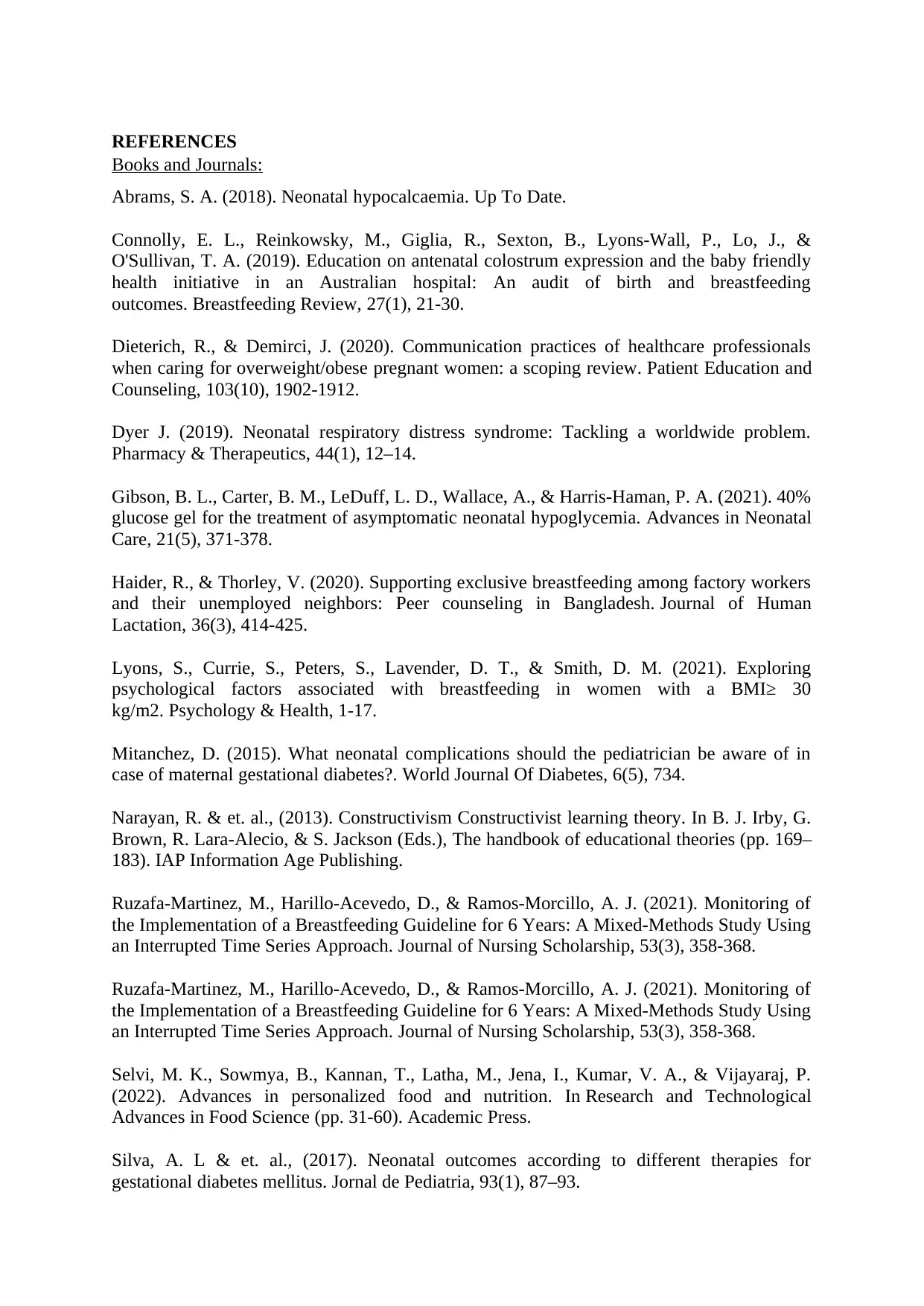
REFERENCES
Books and Journals:
Abrams, S. A. (2018). Neonatal hypocalcaemia. Up To Date.
Connolly, E. L., Reinkowsky, M., Giglia, R., Sexton, B., Lyons-Wall, P., Lo, J., &
O'Sullivan, T. A. (2019). Education on antenatal colostrum expression and the baby friendly
health initiative in an Australian hospital: An audit of birth and breastfeeding
outcomes. Breastfeeding Review, 27(1), 21-30.
Dieterich, R., & Demirci, J. (2020). Communication practices of healthcare professionals
when caring for overweight/obese pregnant women: a scoping review. Patient Education and
Counseling, 103(10), 1902-1912.
Dyer J. (2019). Neonatal respiratory distress syndrome: Tackling a worldwide problem.
Pharmacy & Therapeutics, 44(1), 12–14.
Gibson, B. L., Carter, B. M., LeDuff, L. D., Wallace, A., & Harris-Haman, P. A. (2021). 40%
glucose gel for the treatment of asymptomatic neonatal hypoglycemia. Advances in Neonatal
Care, 21(5), 371-378.
Haider, R., & Thorley, V. (2020). Supporting exclusive breastfeeding among factory workers
and their unemployed neighbors: Peer counseling in Bangladesh. Journal of Human
Lactation, 36(3), 414-425.
Lyons, S., Currie, S., Peters, S., Lavender, D. T., & Smith, D. M. (2021). Exploring
psychological factors associated with breastfeeding in women with a BMI≥ 30
kg/m2. Psychology & Health, 1-17.
Mitanchez, D. (2015). What neonatal complications should the pediatrician be aware of in
case of maternal gestational diabetes?. World Journal Of Diabetes, 6(5), 734.
Narayan, R. & et. al., (2013). Constructivism Constructivist learning theory. In B. J. Irby, G.
Brown, R. Lara-Alecio, & S. Jackson (Eds.), The handbook of educational theories (pp. 169–
183). IAP Information Age Publishing.
Ruzafa‐Martinez, M., Harillo‐Acevedo, D., & Ramos‐Morcillo, A. J. (2021). Monitoring of
the Implementation of a Breastfeeding Guideline for 6 Years: A Mixed‐Methods Study Using
an Interrupted Time Series Approach. Journal of Nursing Scholarship, 53(3), 358-368.
Ruzafa‐Martinez, M., Harillo‐Acevedo, D., & Ramos‐Morcillo, A. J. (2021). Monitoring of
the Implementation of a Breastfeeding Guideline for 6 Years: A Mixed‐Methods Study Using
an Interrupted Time Series Approach. Journal of Nursing Scholarship, 53(3), 358-368.
Selvi, M. K., Sowmya, B., Kannan, T., Latha, M., Jena, I., Kumar, V. A., & Vijayaraj, P.
(2022). Advances in personalized food and nutrition. In Research and Technological
Advances in Food Science (pp. 31-60). Academic Press.
Silva, A. L & et. al., (2017). Neonatal outcomes according to different therapies for
gestational diabetes mellitus. Jornal de Pediatria, 93(1), 87–93.
Books and Journals:
Abrams, S. A. (2018). Neonatal hypocalcaemia. Up To Date.
Connolly, E. L., Reinkowsky, M., Giglia, R., Sexton, B., Lyons-Wall, P., Lo, J., &
O'Sullivan, T. A. (2019). Education on antenatal colostrum expression and the baby friendly
health initiative in an Australian hospital: An audit of birth and breastfeeding
outcomes. Breastfeeding Review, 27(1), 21-30.
Dieterich, R., & Demirci, J. (2020). Communication practices of healthcare professionals
when caring for overweight/obese pregnant women: a scoping review. Patient Education and
Counseling, 103(10), 1902-1912.
Dyer J. (2019). Neonatal respiratory distress syndrome: Tackling a worldwide problem.
Pharmacy & Therapeutics, 44(1), 12–14.
Gibson, B. L., Carter, B. M., LeDuff, L. D., Wallace, A., & Harris-Haman, P. A. (2021). 40%
glucose gel for the treatment of asymptomatic neonatal hypoglycemia. Advances in Neonatal
Care, 21(5), 371-378.
Haider, R., & Thorley, V. (2020). Supporting exclusive breastfeeding among factory workers
and their unemployed neighbors: Peer counseling in Bangladesh. Journal of Human
Lactation, 36(3), 414-425.
Lyons, S., Currie, S., Peters, S., Lavender, D. T., & Smith, D. M. (2021). Exploring
psychological factors associated with breastfeeding in women with a BMI≥ 30
kg/m2. Psychology & Health, 1-17.
Mitanchez, D. (2015). What neonatal complications should the pediatrician be aware of in
case of maternal gestational diabetes?. World Journal Of Diabetes, 6(5), 734.
Narayan, R. & et. al., (2013). Constructivism Constructivist learning theory. In B. J. Irby, G.
Brown, R. Lara-Alecio, & S. Jackson (Eds.), The handbook of educational theories (pp. 169–
183). IAP Information Age Publishing.
Ruzafa‐Martinez, M., Harillo‐Acevedo, D., & Ramos‐Morcillo, A. J. (2021). Monitoring of
the Implementation of a Breastfeeding Guideline for 6 Years: A Mixed‐Methods Study Using
an Interrupted Time Series Approach. Journal of Nursing Scholarship, 53(3), 358-368.
Ruzafa‐Martinez, M., Harillo‐Acevedo, D., & Ramos‐Morcillo, A. J. (2021). Monitoring of
the Implementation of a Breastfeeding Guideline for 6 Years: A Mixed‐Methods Study Using
an Interrupted Time Series Approach. Journal of Nursing Scholarship, 53(3), 358-368.
Selvi, M. K., Sowmya, B., Kannan, T., Latha, M., Jena, I., Kumar, V. A., & Vijayaraj, P.
(2022). Advances in personalized food and nutrition. In Research and Technological
Advances in Food Science (pp. 31-60). Academic Press.
Silva, A. L & et. al., (2017). Neonatal outcomes according to different therapies for
gestational diabetes mellitus. Jornal de Pediatria, 93(1), 87–93.
⊘ This is a preview!⊘
Do you want full access?
Subscribe today to unlock all pages.

Trusted by 1+ million students worldwide
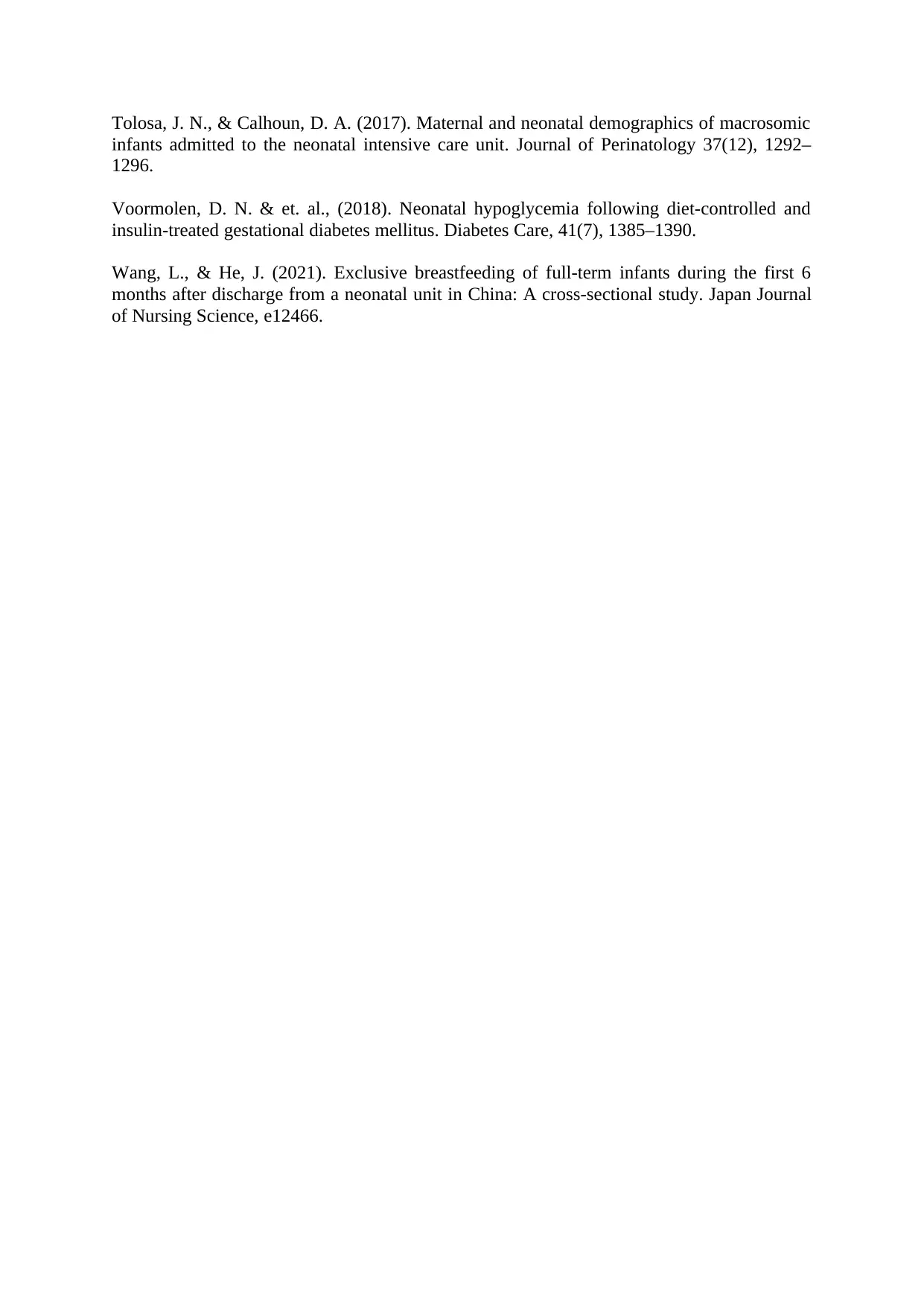
Tolosa, J. N., & Calhoun, D. A. (2017). Maternal and neonatal demographics of macrosomic
infants admitted to the neonatal intensive care unit. Journal of Perinatology 37(12), 1292–
1296.
Voormolen, D. N. & et. al., (2018). Neonatal hypoglycemia following diet-controlled and
insulin-treated gestational diabetes mellitus. Diabetes Care, 41(7), 1385–1390.
Wang, L., & He, J. (2021). Exclusive breastfeeding of full‐term infants during the first 6
months after discharge from a neonatal unit in China: A cross‐sectional study. Japan Journal
of Nursing Science, e12466.
infants admitted to the neonatal intensive care unit. Journal of Perinatology 37(12), 1292–
1296.
Voormolen, D. N. & et. al., (2018). Neonatal hypoglycemia following diet-controlled and
insulin-treated gestational diabetes mellitus. Diabetes Care, 41(7), 1385–1390.
Wang, L., & He, J. (2021). Exclusive breastfeeding of full‐term infants during the first 6
months after discharge from a neonatal unit in China: A cross‐sectional study. Japan Journal
of Nursing Science, e12466.
1 out of 7
Related Documents
Your All-in-One AI-Powered Toolkit for Academic Success.
+13062052269
info@desklib.com
Available 24*7 on WhatsApp / Email
![[object Object]](/_next/static/media/star-bottom.7253800d.svg)
Unlock your academic potential
Copyright © 2020–2026 A2Z Services. All Rights Reserved. Developed and managed by ZUCOL.





